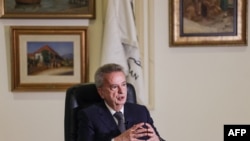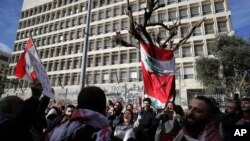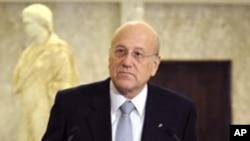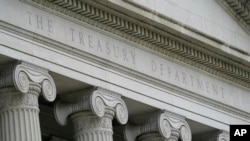The whereabouts of Lebanon's Central Bank head Riad Salameh is not known, and observers say he appears to be on the run after police raided his office and two homes. A Lebanese judge had issued a subpoena earlier this month for Salameh to appear for questioning after he failed to attend three hearings. Salameh has come under intense scrutiny since the collapse of Lebanon's banking sector in 2019.
Lebanese Investigative Judge Ghada Aoun told the Associated Press that Central Bank Governor Riad Salameh failed to show up for questioning for a fourth time on Tuesday. She alleges Salameh is defying judicial orders because he has protection from the ruling elite.
A senior judicial source told Dubai’s The National newspaper that the State Security tried to bring Salameh in for questioning, but that he was not under arrest.
A Lebanese anti-corruption group known as The People Want to Reform the System, have filed a lawsuit against Salameh, accusing him of embezzlement, wasting public funds, illegal enrichment and money laundering, according to media reports.
Meanwhile, Germany, Luxembourg, France, Liechtenstein and Switzerland are also investigating him on suspicion of money laundering.
Many Lebanese believe the banker is in part responsible for Lebanon’s dire financial crisis, which has seen the national currency lose more than 90% of its value, debt grow, and foreign reserves dry up. Denying any wrongdoing, Salameh has accused Judge Aoun of bias. News reports quote Salameh as saying he has asked for an audit of transactions and investments during his tenure that he says found no misuse of public money.
The 71-year-old central bank governor has held his position for nearly three decades, receiving support from many politicians, including Prime Minister Najib Mikati.
Professor Habib Malik of the Lebanese American University tells VOA that Salameh is seen as part of the wider problem involving the corrupt political elite.
“All of this focus on Salameh, he is basically the facilitator, the accountant. He is the one who helped some of these crooks over many years and certainly in 2019 to hide their money and take it out of the country. But they’ve been doing this from years before. They are the real source of the problem. I think he has a lot of information that can be damaging to a lot of these people. At the same time, I think he is also fearful for his life,” said Malik.
The United States has initiated a number of actions to help Lebanon combat corruption. They have included placing sanctions in recent years on politicians such as former Foreign Minister Gebran Bassil, whom U.S. officials in 2020 said had played a major role in corruption in Lebanon.
Malik urges the U.S. government to do more and work together with Europe to bring justice to the Lebanese people.
“The U.S. Treasury has an enormous amount of information about the money trail," he said. "All they have [to] do is work closely with some of these European countries and much of the picture can be pieced together. That is what the U.S. does before they slap sanctions on anyone. When the file is fully documented and no chance of refuting the charges, then they release it. These people can’t get away indefinitely, but it requires a will. The West has the tools, do they have the will?”
Lebanese media outlets have reported that Salameh, his brother and an aide were allegedly involved in illegal businesses, including money transfers abroad, despite informal capital controls in Lebanon.







